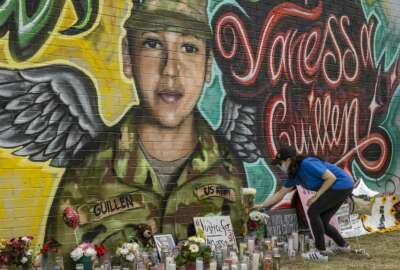
Army changing how sexual harassment is investigated
The changes spurs from a recommendation from the review of Ft. Hood after several high-profile tragedies including the harassment and death of Spc. Vanessa Guil...
The Army is changing the way sexual harassment is handled within units in response to a blockbuster report that found soldiers did not trust their commanders when it came to assault and harassment on one of the service’s largest bases.
The new policy put out by Army Forces Command — which encompasses all active-duty soldiers — takes sexual harassment complaint investigations outside of the brigade where the harassment took place and appoints an investigating officer from another brigade to look into the matter.
The action is one of the 70 recommendations made by the Ft. Hood Independent Review Committee, which states, “Investigations of sexual harassment must be handled by a 15-6 Investigating Officer from a different brigade or brigade equivalent than the subject, who are trained by and work closely with a legal advisor to conduct a thorough and complete investigation.”
The memo directing the new policy and signed by Army Forces Command leader Gen. Michael Garrett, states that “ensuring investigations are conducted by an outside investigator will aid in building trust and confidence in the sexual harassment/assault response and prevention reporting system.”
The policy does not go as far as taking assault and harassment investigations completely out of the chain of command and allowing independent organizations to do the work.
That proposal has been championed by several top lawmakers as sexual assaults in the military continue to rise.
“Nearly all commanders are not attorneys, and are ill equipped to make the kind of increasingly complex legal decisions that the military justice system requires,” Eugene Fidell, senior research scholar and adjunct professor at Yale Law School, said last week during a Senate Armed Services Personnel Subcommittee hearing on the issue.
Sexual assault and harassment have plagued the military for decades. Recent reports from the RAND Corporation found that service members are more likely to leave the military after being assaulted and that units that were lax about sexual harassment experienced more assault. The reports said both were readiness issues and hurt the military’s ability to retain top talent.
After the death of Army Specialist Vanessa Guillen last summer at Ft. Hood the military is doubling down on its sexual assault prevention efforts.
As one of his first acts in office, Defense Secretary Lloyd Austin mandated a commission on sexual assault.
The commission is now just getting underway, however it pledges to leave all options on the table and to take into account the lived experiences of troops.
“Let this be the last commission on sexual assault in the military. That should be our goal,” Commission Chairwoman Lynn Rosenthal said last week. “What we’ll be asking is what hasn’t been tried? What happens in civilian society that is a best practice that we could try on the military side? What are the unique attributes of the military environment that allows us to do things that we can’t do on the civilian side? That comparison is very important, and with these folks that we’re bringing in, we’ll be looking at this with fresh eyes.”
Copyright © 2024 Federal News Network. All rights reserved. This website is not intended for users located within the European Economic Area.
Scott Maucione is a defense reporter for Federal News Network and reports on human capital, workforce and the Defense Department at-large.
Follow @smaucioneWFED
Related Stories





